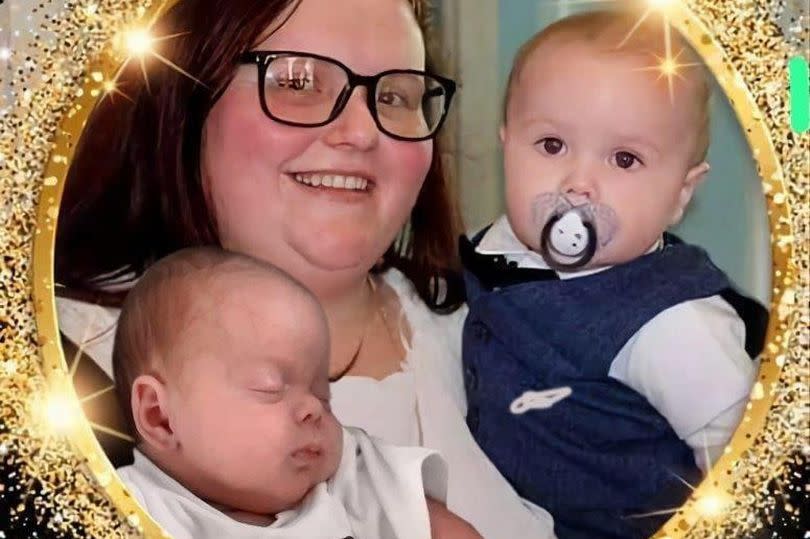Double tragedy as pregnant mum, 22, and newborn die two months apart

A pregnant mum who died from a catastrophic blood clot after a series of tests was 'let down', an inquest has heard. A doctor admitted there were 'significant failings' in the care of Laura Barnes., who collapsed and died in May 2022.
After her collapse, Laura, who was pregnant at the time, gave birth via emergency caesarean section to Dexter. She never regained consciousness and, in a double tragedy for her family, however, he died two months after his mother, who never got to meet her son.
An inquest into the 22-year-old's death yesterday (April 30) heard she was 15 weeks pregnant with Dexter when she was first admitted to the Royal Blackburn Hospital in January 2022. She was diagnosed as having a clot in a vessel within her skull and was started on tinzaparin, an anti-coagulant which is used to treat deep venous thrombosis and prevent blood clots from forming.
READ MORE: 'I lost half of my family to the same thing'
However, the hearing at Preston Coroner's Court heard she wasn't given the correct dose of medication and there is no evidence that Laura was ever weighed in order to determine the correct dose, Lancs Live reports.
Laura's weight was recorded as increasing from 151kg to 177kg in the space of just three weeks, the hearing heard. Several doctors have said this level of weight gain was highly unlikely and it was probable that her weight had been taken from her records four years earlier.

Laura, who has another son, Jackson, also later told her mum, Jennifer, that she had never been weighed during her admission for the stroke in January. As a result the level of medication prescribed was insufficient to prevent Laura from developing a further blood clot.
As her pregnancy was classed as high risk, due to her weight and having suffered from pre-eclampsia when she was pregnant with her son in 2018, Laura was under the care of a consultant. When obstetrics consultant Dr Sarah Davies noticed that Laura's anti-coagulation levels were well below the target she arranged for regular testing.
However, out of nine blood tests, only one was successful. The remainder either failed due to the samples not being sent to the lab or because appointments were cancelled.
Dr Davies admitted that in May 2022 when she realised the only successful test - undertaken in the March - indicated that Laura was "chronically under-anticoagulated", she did not increase the dose. Six days later Laura, who weighed 189kg (29 stone) at the time, collapsed and died from a blood clot in her lung.
'We let Laura down'
Dr Davies admitted there had been several "significant failings" in Laura's care and said that errors were "disappointing" and "frustrating". Senior Coroner Dr James Adeley then asked Dr Davies how she felt to discover she had not been made aware the tests had failed.
"Disappointing... I feel that we let Laura down," Dr Davies replied. "It is a very poor system." On May 23, the last time Dr Davies saw Laura, she requested an urgent blood test.
"I found out afterwards that Laura had fainted during one of the blood tests; the message about the importance of it going to the lab wasn't relayed," Dr Davies added. "Another failure?" Dr Adeley asked, to which Dr Davies replied: "Yes."
After Laura collapsed on May 29, 2022, her unborn baby, later named Dexter, was delivered via emergency caesarean section. Two months after Laura's death, Dexter tragically died while he was sleeping in his dad's bed alongside his 14-month-old brother.
Laura's mum, Jennifer, who lives in Barrow-in-Furness, said there had been several errors in her daughter's care. She said it was heart-breaking that Laura had never been able to meet Dexter due to her collapsing before he was born.
Professor Charles Hay, a consultant in haematology at Manchester Royal Infirmary, examined Laura's records and said that Laura was 15 to 30 times at greater risk of developing a blood clot. However, he added that if Laura had been correctly anti-coagulated she would not have suffered the second clot which caused her death.
Prof Hay said: "Not enough heparin had been dispensed to cover the whole period and we know from the GP's evidence that the practice didn't prescribe; neither would I have expected them to. Either doses were missed or she ran out a month or so before she died."
Laura's then partner Shane said he would leave for work in the mornings while she was still asleep and she would tell him she would do the morning injections but this was disputed by Laura's mum. Shane also said he had no reason to believe Laura hadn't done her own injections and he claimed that she hadn't run out.
Furthermore, on May 23 at the last antenatal appointment before Laura died, she said she still had a week's worth of injections. "It would appear that Laura is not having her doses of heparin twice a day; she can't have been or you would have run out," the coroner said to Shane.
Since Laura's death all women requiring blood tests to ascertain anti-coagulation levels have had to travel to Manchester. East Lancashire Hospitals NHS Foundation Trust (ELHT) has plans to create a team locally but it is not yet fully-staffed despite almost two years having passed since Laura died.
Dr Adeley said he was highly concerned that ELHT is considering reintroducing a system whereby anti-coagulation level testing is done in-house.
He said: "The way in which the monitoring was carried out in this case... it is not even vaguely fit for purpose. The fact you are even thinking about reactivating this on the basis of half-baked documentation... You are either going to let me know this service is suspended until everything is checked out or you are going to get a Prevention of Future Deaths report."
'This system was a complete failure'
Returning a narrative conclusion, Dr Adeley said: "The fact that the treating consultant was unaware that eight out of nine tests failed shows that this system was a complete failure.
"Even when it did produce a result this was not acted upon. Any system such as this is unfit for purpose and any system which resembles it in the future has my gravest concerns."
However, despite his concerns about the system he described as "hapless and lackadaisical", the coroner said that Laura's death was caused by her not taking the tinzaparin correctly. "Even at the lower doses it would have prevented a clot forming," Dr Adeley said.
"Laura Jane Barnes died on May 29, 2022, at the Royal Blackburn Hospital of a massive pulmonary embolism. A risk was significant due to previous clots, pregnancy and morbid obesity. Anti-coagulation did not prevent her death due to non-compliance."

 Yahoo News
Yahoo News 
